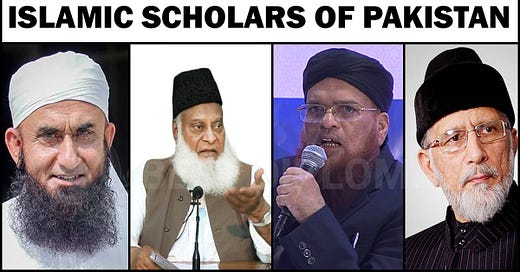Jihaad Movement And Muhammadi Transparency Assurance Law
Are the Pakistani Islamic Scholars going in the Right Direction today?
Shaykh Ul Islam Mufti Muhammad Taqi Usmani, Shaykh Ul Islam Dr Muhammad Tahir Ul Qadri, Maulana Fazlurrehman and Mufti Muneeb Ur Rehman must never forget this fundamental belief that the Recently Announced and Pledged Jihaad Movement will never be successful without the Constitutional Adoption, Practice, and Enforcement of the Muhammadi Transparency Assurance Law in all Muslim States.
Most Warning Questions:
Will the Pledged Jihaad Movement be proved a Hypocritical Exercise without the Constitutional Adoption, Practice, and Enforcement of the Muhammadi Transparency Assurance Law? Can we practice and protect Islam without practising the Muhammadi Transparency Assurance Law?
The abovementioned assertion highlights the Critical Link between the Unanimously Pledged Jihaad Movement and the need for governance grounded in the Muhammadi Transparency Assurance Law. Here are some Key Points to consider regarding this relationship:
Importance of the Muhammadi Transparency Assurance Law
Foundation of Justice: The Muhammadi Transparency Assurance Law likely focuses on principles of Justice, Accountability, and Ethical Governance, which are essential for a successful Jihaad Movement. Without a solid foundation in these principles, the Jihaad Movement will risk losing its Moral Legitimacy.
Public Confidence: For any movement, particularly one involving Jihaad, public trust is paramount. The enforcement of transparent laws can foster greater confidence among the population and motivate support for the Jihaad Movement.
Avoiding Hypocrisy: If the Jihaad Movement claims to pursue a noble cause while neglecting the fundamental principles of governance as outlined in the Muhammadi Transparency Assurance Law, it may be perceived as hypocritical. This perception can undermine the movement's credibility and effectiveness.
Constitutional Adoption: The constitutional backing of the Muhammadi Transparency Assurance Law ensures that it is not just a theoretical concept but a practised standard. This adoption is crucial for establishing a framework for fair governance that aligns with Islamic Principles.
The Necessity of the Muhammadi Transparency Assurance Law
Solid Foundation: The sustainably perpetual success of any movement, especially one centred on Jihaad, relies heavily on a clear ethical and moral framework. The Muhammadi Transparency Assurance Law likely encapsulates principles that ensure governance is just, transparent, and accountable.
Perception of Legitimacy: Without constitutional endorsement and practice of this law, the Jihaad Movement may be perceived as lacking genuine commitment to its stated ideals. If the movement operates in secrecy or without accountability, it risks being viewed as hypocritical.
Moral Authority: For leaders like Shaykh Ul Islam Mufti Muhammad Taqi Usmani, Shaykh Ul Islam Dr Muhammad Tahir Ul Qadri, Maulana Fazlurrehman, and Mufti Muneeb Ur Rehman, promoting transparency is crucial. Their influence means that advocating for the adoption of such Transparency Laws can enhance the Movement's Moral Standing, making it more acceptable to the broader Muslim community.
Building Trust and Support: Effective governance laws foster transparency, build public trust, and encourage Broader Participation. If the Jihaad Movement does not emphasize these principles through established laws, it may fail to attract the necessary support from the Muslim Community.
The success of the Recently Pledged Jihaad Movement in Pakistan could indeed be jeopardized without the Constitutional Adoption, Practice, and Enforcement of the Muhammadi Transparency Assurance Law. It would likely be viewed as insincere and hypocritical if it does not align its practices with the Islamic Ethical Standards it seeks to promote. This alignment is essential for gaining the support of the Muslim Community and achieving meaningful progress toward its Pledged Objectives.
Conclusion
In conclusion, without the
Are our scholars and intellectuals thinking and making efforts in the right direction on the issue of Palestine and Kashmir?
Do we really practice the Muhammadi Transparency Assurance Law in our daily lives with the required level of piety and devotion?
This article has been written and compiled by Muhammad Fazal Ur Rehman Siddiqui.
Karachi - Pakistan
15 April 2025



